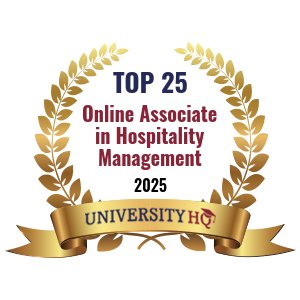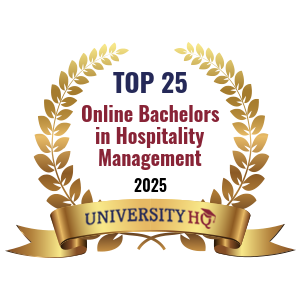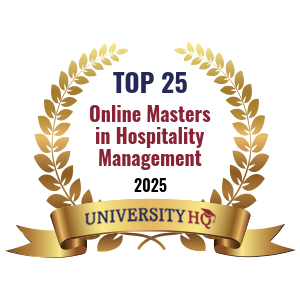What is Hospitality Management?
Are you interested in working in the hospitality or tourism industry in Alaska? Pursuing a hospitality management degree may be your ideal path into this industry. With Alaska's tourism industry flourishing and demand for skilled hospitality managers increasing, traditional or online hospitality or food and beverage management degrees can provide a convenient means of furthering your education while still meeting work and personal commitments.
When selecting an Alaska school to pursue hospitality management studies or a hotel management degree, you aren’t going to have many options for a bachelor's degree. Students who cannot find the program they are interested in may want to consider earning a degree online from a school outside of the state. These types of degrees have come a long way in the last ten years and can provide quality education at a reasonable price.
When selecting a hospitality management school, several key considerations should be taken into account. Accreditation is paramount as this ensures the school meets certain educational standards; additionally, faculty expertise and industry connections may be prioritized for optimal learning opportunities and networking prospects for its students.
Finding the right school for your career goals and interests is key, whether that means culinary arts, hotel operations, or event management. There are many educational programs that can help you thrive in hospitality industry careers.

Featured Online Programs
Advantages of Hospitality Management Education
Hospitality management education, rather than general business administration or management courses, can offer many advantages to those interested in entering the industry. The curriculum covers key areas such as customer service, event management, and hotel operations to give an in-depth knowledge of this sector of industry. Practical experience in hotel management gives students an invaluable opportunity to apply their knowledge in real-life settings and prepare for the challenges associated with working in this industry. By gaining hands-on experience in this area, students develop key leadership, problem-solving, and teamwork skills essential for working within hospitality environments.
An undergraduate degree in hospitality management opens doors to numerous career options within the tourism industry, from hotels and restaurants to resorts, event planning companies, tourism agencies, and tourism promotion firms - giving graduates plenty of choices that align with their interests and career objectives. Hospitality management education equips students with the knowledge and skills to deliver outstanding customer experiences, which means understanding customer needs, effectively resolving any issues that arise, and creating a welcoming and enjoyable atmosphere for guests.
Overall, a degree in hospitality management provides individuals with a firm foundation in the industry and equips them for rewarding careers in tourism and hospitality. From hotel management and event planning to tourism coordination and coordination - having studied hospitality management will put you on the road to success in your future career goals.
Online vs On-Campus
When selecting a hospitality management program, there are two different routes available to you - either an online degree or attending traditional on-campus programs. Each option offers their own advantages and considerations.
Online Programs
Online hospitality management degrees provide flexibility and convenience, enabling students to study on their own time from anywhere with internet access, which may be particularly attractive to those whose work or family obligations make attending on-campus classes challenging. You can also aim to earn a business administration or hotel management degree from one of the best hospitality management online schools in the country since you won't need to attend in-person.
With an online program, you have the flexibility to craft your study schedule around what works for you - whether that is in the mornings, evenings, or weekends. Course materials, lectures, and assignments may all be accessible when it is most convenient for you, allowing you to balance education with other responsibilities in life. However, you should be aware that some online degree programs are synchronous, meaning that you must watch lectures when they happen rather than asynchronous, in which you access lessons and materials whenever you wish.
On-Campus Programs
On-campus hospitality management degree programs typically provide an immersive and traditional learning experience and may include resources, facilities, and networking opportunities that will boost both your education and career opportunities. On-campus programs for culinary arts and lodging management typically provide hands-on training, as well as access to industry standard equipment and facilities, giving you the ability to hone practical skills under guidance from experienced faculty members.
On-campus degree programs also present invaluable networking opportunities. You can meet classmates, faculty, and industry professionals; attend guest lectures and workshops; participate in internships or cooperative education programs; and form personal connections to secure internships, job opportunities, or mentorship within the hospitality industry.
Choosing the Right Program for You
The decision between an online hospitality management program and an on-campus program ultimately depends on your personal preferences and career goals.
Consider the following factors when making your decision:
- Your preferred learning style and study environment
- Your ability to balance work or family commitments with your education
- The specific skills and knowledge you wish to acquire
- The level of hands-on experience you desire
- The networking and internship opportunities available
Online Associates (AS)

Studying for an associate degree in hospitality management opens up a world of exciting opportunities within the dynamic hospitality industry. With courses that cover a wide range of topics such as hotel operations, events management, and food and beverage service, students gain a comprehensive understanding of what it takes to succeed in this fast-paced field. By delving into practical modules like customer service techniques and revenue management strategies, aspiring hospitality professionals are equipped with the skills needed to excel in various roles.
The emphasis on experiential learning in many hospitality management programs allows students to apply their knowledge in real-world settings. Internships and hands-on projects provide valuable insights into the day-to-day operations of hotels, restaurants, and other establishments. This practical experience not only enhances students' understanding of the industry but also helps them build a strong network of contacts that can be invaluable for future career prospects. Overall, pursuing an associate degree in hospitality management with its diverse range of courses sets individuals on a path towards a fulfilling and rewarding career in this vibrant sector.
Online Bachelors (BS)

Embarking on a bachelor's degree in hospitality management offers a plethora of exciting coursework that goes beyond traditional classroom learning. Students delve into the world of hospitality operations, strategic management practices, and customer service excellence. Courses such as food and beverage management provide insight into the intricate details of running a successful restaurant or catering business, while Hotel Operations courses offer a glimpse into the dynamic workings of the hotel industry.
Students can expect to explore innovative trends shaping modern hospitality landscapes through coursework like event planning and management. This allows for hands-on experience in organizing events from start to finish, honing essential skills in budgeting, marketing, and client relations. By immersing themselves in these diverse courses, students can cultivate a well-rounded understanding of the multifaceted nature of the hospitality industry – preparing them for dynamic career paths post-graduation.
Online Masters (MS)

Pursuing a master's degree in hospitality management offers a unique blend of theoretical coursework and hands-on practical experience. In addition to traditional subjects like finance, marketing, and operations, students engage with cutting-edge topics such as sustainable tourism practices and digital marketing strategies tailored to the industry. This dynamic curriculum equips graduates with the knowledge needed to navigate the ever-evolving landscape of the hospitality sector. Coursework in a hospitality management program often includes opportunities for real-world application through internships and experiential learning projects.
These experiences not only provide valuable insight into industry best practices but also allow students to cultivate essential leadership skills in a fast-paced environment. Ultimately, combining academic rigor with practical training ensures that graduates are well-prepared to excel in diverse roles within the hospitality industry, from hotel management to event planning and beyond.
By carefully evaluating these factors, you can choose the program that aligns with your needs and sets you up for success in the exciting field of hospitality management.
Our paying for college guideGet Matched With Hospitality Management Colleges
Steps to Become a Hospitality Manager: A Comprehensive Guide
To embark on a successful career in hospitality management, you need to combine formal education, practical experience, and essential soft skills. Most hospitality management positions require at least a bachelor's degree in hospitality management or a closely related field. This educational foundation equips you with the knowledge necessary to manage various aspects of hotels, tourism, and lodging.
Gaining practical experience is crucial. Many full-service hotels and upscale establishments look for candidates who have hands-on experience in the hospitality industry. This could include roles in food and beverage services, customer service, or any position that cultivates leadership skills and a keen understanding of guest satisfaction.
Navigating a career in hospitality management also means developing strong interpersonal skills. As a hospitality manager, you will need to interact with people from diverse social, economic, and cultural backgrounds. This aspect of the job makes it dynamic and rewarding, allowing you to learn continuously and adapt to new challenges.
-
1. Earn a Degree
Starting with a formal education is essential. Most hospitality managers hold a bachelor’s degree in hospitality management, business administration, or a related field. -
2. Gain Practical Experience
Work experience in the hospitality industry is vital. Whether it’s a part-time job at a hotel or an internship, practical experience helps you develop hands-on skills and networking opportunities. -
3. Develop Soft Skills
Effective communication, leadership, and customer service skills are critical. In the hospitality field, you will work with individuals from diverse backgrounds, making interpersonal skills crucial. -
4. Obtain Certifications
Certifications like the Certified Hospitality Supervisor (CHS) can enhance your resume. These certifications often require a combination of education and experience but can set you apart in the competitive field. -
5. Network within the Industry
Building relationships with other professionals is crucial. Joining industry associations and attending hospitality management conferences can provide valuable insights and opportunities. -
6. Apply for Management Positions
Begin by applying for entry-level management jobs such as assistant manager. These roles provide the necessary experience and pave the way for higher-level management positions. -
7. Continue Professional Development
Staying updated with industry trends and continuing your education through workshops and courses is important. This ensures you remain competitive and knowledgeable in your field.
By following these steps, you can effectively prepare for a successful career as a hospitality manager.
Potential Career Paths for Graduates
Hospitality management degrees open up many career possibilities in hospitality. Graduates can pursue roles such as hotel manager, event planner, restaurant manager, and tourism coordinator. An undergraduate degree program in hospitality management equips students with all the knowledge and skills required for success in many hospitality fields, ranging from hotels and restaurants to event management companies and tourism agencies - even more specialization may be available, such as culinary arts management or tourism as a specialty field of study for graduates of these programs.
Job Roles
- Hotel Manager
- Restaurant Manager
- Event Planner
- Tourism Coordinator
These are just a few examples of the diverse job roles available to graduates of a hospitality management program. With a degree in hospitality management, you can pursue careers in various sectors of the hospitality industry including hotels, resorts, restaurants, event planning companies, tourism agencies, and more.
Specialization Options
Hospitality management is an expansive field that offers students numerous specialization options. By choosing from hospitality degrees in areas like hotel administration, hospitality sales, restaurant management, tourism, or even hospitality law you can tailor your education specifically to match your career objectives in the industry. You could work in hospitality with just a business degree, but a focused program with other courses in hospitality will make it easier.
- Event Management
A specialization in event management provides students with the knowledge and skills to organize events ranging from corporate conferences to weddings and music festivals, while also covering logistics, budgeting, marketing, and customer service and relations. Students can gain hands-on experience through internships while organizing events or interacting with clients - which ultimately prepares them for careers in this ever-evolving field. - Hotel Management
Hotel management courses equip students with a thorough understanding of managing hospitality establishments such as hotels and resorts. Through coursework focused on operations management, revenue optimization, guest services delivery, and marketing for hospitality establishments students will gain all the knowledge they need. Practical training at leading hotels allows students to apply their knowledge in real life situations while honing skills needed for successful careers in hotel management. - Tourism
Travel enthusiasts who want to specialize in tourism may find an intriguing career path within the hospitality industry. Students studying tourism trends, destination marketing, sustainable tourism practices, and customer experience management will gain invaluable experience in this specialized area, which may lead to roles such as tourism destination managers, travel consultants, tour operators services, or even starting your own travel businesses.
By choosing a concentration, students can acquire specialized knowledge and practical skills that set them apart in the competitive hospitality job market. Furthermore, specialization allows individuals to delve deeper into specific areas of interest that fuel career advancement while opening doors within this dynamic industry.
Hospitality Future Career Outlook
According to the Bureau of Labor Statistics, employment of lodging managers is projected to increase 7% between 2022-2032 - faster than many other occupations - and creating new job opportunities in hotels, restaurants, and event planning companies.
| Occupation | Median Annual Wage (May 2022) | Job Outlook (2022-2032) |
|---|---|---|
| Hotel Manager | $61,910 | 7% (Faster than average) |
| Event Planner | $52,560 | 8% (Faster than average) |
| Restaurant Manager | $61,310 | 0% (Little or no change) |
Note: Median annual wages and job outlook data are sourced from the Bureau of Labor Statistics, and actual salaries and employment opportunities may vary depending on factors such as experience, location, and industry.
Practical Experience
Gaining practical experience is integral to developing an in-depth knowledge of the hospitality industry. Some hospitality programs often feature internships, co-op placements, or work study opportunities that give students direct hands-on experience within their field of study, helping students hone important customer service and problem-solving abilities, as well as how to apply theoretical knowledge practically in everyday situations.
Through actively engaging in lodging management tasks, students can deepen their understanding of the hotel industry's operations and dynamics. Students gain experience working in real hotel environments interacting with guests, managing staff, and facing day-to-day challenges that arise during operations.
Customer service is an integral component of hospitality industry careers, and real-life experience allows students to hone and refine their customer service abilities. By engaging with customers directly in real life settings, students learn about customers' needs, anticipate expectations, and deliver outstanding service that sets them apart from other hospitality businesses. Students learn to think on their feet when unexpected situations arise, and they develop effective solutions to ensure the smooth running of operations in hospitality settings.
Employers in the hospitality industry highly value practical experience in their hospitality managers. It demonstrates not only theoretical knowledge, but also acquired practical skills and competence that enables them to excel in real-life scenarios. Candidates with hands-on experience have an edge when competing for employment as they can better navigate demands and challenges.
Growing Demand
Alaska is home to an expanding tourism industry and variety of hospitality establishments, creating ample job opportunities in hospitality management. Demand for skilled individuals continues to surge rapidly in this sector, making a bachelor's degree in this discipline an invaluable asset. Graduates of hospitality management programs can find employment in hotels, resorts, restaurants, event venues or any other hospitality-related businesses.
| Benefits | Statistics |
|---|---|
| Abundant job opportunities | Ranked 68th most popular major in Alaska |
| Contribution to Alaska's economy | Thriving tourism industry and numerous hospitality establishments |
| Career growth potential |
As Alaska's hospitality industry expands, so too does its need for skilled hospitality management professionals who possess both the knowledge and tools to thrive in this dynamic field. A bachelor's degree in hospitality management provides you with all the tools to excel in this sector and enhance guest experiences positively. By choosing Alaska as your base for hospitality endeavors, you have an excellent opportunity to contribute economically while enjoying a fulfilling and fulfilling profession.
Frequently Asked Questions
What are the advantages of an online hospitality management degree?
Earning an online hospitality management degree provides students with greater flexibility, allowing them to juggle studies with other obligations more easily. Accredited online programs offer high-quality education recognized by employers.
What career opportunities exist within hospitality management?
Graduates of hospitality management degree programs can pursue various roles such as hotel manager, event planner, restaurant manager, and tourism coordinator. This degree equips students for various positions within hotels, restaurants, event management companies, and tourism agencies.
Why is practical experience crucial in hospitality management?
Practical experience provides students with a chance to develop real-world skills like customer service and problem-solving, as well as gaining a deeper insight into the industry itself and applying their knowledge practically, ultimately increasing their career prospects.
Can I specialize within hospitality management?
Absolutely; hospitality management provides several specialization opportunities such as those in event, hotel, or tourism management, which allows students to focus their studies according to their interests and desired career goals in this industry.
Search All Programs
